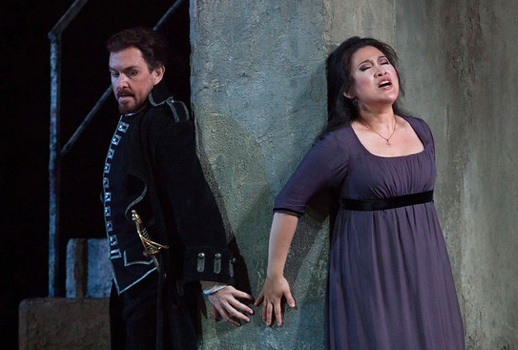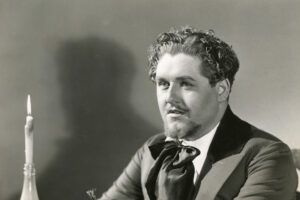

Maestro Daniele Callegari led a propulsive, energetic, conversant performance, never sagging and always supportive of the singers.
Ms. Yu proved to be the star of the afternoon and made an auspicious debut, receiving a tremendous ovation after “Tacea la note placida.” She has all the technical goods for the part, a “juicy” lyric soprano, good agility and dynamic control, enough breath for the required long lines, even and well-knit registers, good colouring of the phrases.
The slightly covered quality of its middle and low voice reminded me of Angela Gheorghiu, but without the obtrusive vibrato (or “prominent” vibrato, if that’s your taste) and darkness – Yu’s top is brighter and more silvery. “D’amor sull’ali rosee” and the ensuing cabaletta brought out another big ovation from the audience, but she might have run out of steam a bit due to the slow, languorous tempo, and the final notes of “Di te scordarmi” came out softer than it was perhaps intended.
Perhaps the voice is a bit too light for the heavier Verdi roles, such as Aida or the other Leonora, but I see a Norma and more of the Anna Netrebko rep in her future (but with better bel canto technique…). She moves well on stage, but her acting lacked a certain abandon (and to some degree, her singing as well). Her death scene with Manrico became a more generalized rolling on the floor, and she could have benefitted from better stage direction. She could also have benefitted from acting lessons from last season’s Leonora, Patricia Racette, a tremendous stage actress but unfortunately vocally miscast in this role. Overall though, Yu was a very fine fit to this role.
Gwyn Hughes Jones was the serviceable Manrico, his somewhat bright, thin tenor unfortunately not heroic enough to my taste. Worse, it has a slightly nasal and whiny quality, particularly under pressure, and I missed a certain lachrymose quality to it, not to mention squillo. His final note in “Di quella pira” was subdued and soft, failing to make much effect. (Though, these days, that’s asking too much…) But like the rest of the cast, he was a committed performer and gave a good performance.
This is was my fifth Trovatore at the Met, and my third production at the house. In 1993, I attended my first Trovatore, in the old, dark, depressing Melano-Frigerio-Squarciapino production dominated by bare, huge stairways and columns. That evening was dominated by the lower voices, Vladimir Chernov as di Luna and Dolora Zajick as Azucena – but with a Manrico who, whatever his faults, had a heroic, beefier sound, Kristian Johannsson.
On Saturday, almost twenty years later, I saw Zajick deliver her second Azucena in my opera-going history. The tone is drier than it used to be (although hers was never a rich, plush tone, tending more towards metallic) and the lower and higher voices differ much more in quality. She gave a commanding, solid, compelling performance, somewhat more subdued than in the past, never resorting to barking and never tending towards the demented option that many mezzos take (a la Marianne Cornetti last season).
The Met audience clearly loves her and gave her a tremendous ovation at curtain call. Baritone Franco Vassallo as di Luna, looking younger than the Manrico, gave a competent and committed performance. As Ferrando, Morris Robinson gave a commanding performance, his throbbing, dark bass carefully negotiating the more agile sections.
Overall this was uniformly the best ensemble cast in my history of attending Trovatore at the Met, and they all worked together towards a coherent, acceptable resolution (as much as it is possible with this opera). At the end, for once, the deaths of Leonora and Manrico and the despair of di Luna were real for me, rather than the perfunctory ejaculations of performers in a tortuous and implausible plot.
Photo: Marty Sohl


























Comments